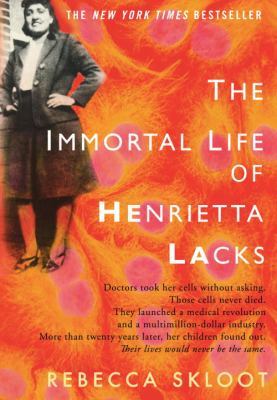My beloved friend Jen is joining us today for All Lady July. At this point she should have an official title like "Special Science Correspondent for Library Educated". She has joined us before talking about brains. She's back this year to share with us an amazing true story about a woman who was almost forgotten despite her great contribution to science. Thanks for being here Roommate Jen. AND Happy Birthday tomorrow! Take it away!...
Before I even started
reading The Immortal Life of Henrietta
Lacks, I knew I wanted to see if Wesley would let me review it for All Lady
July. (The door is always open for you Jen!) It’s an important story about a lady and her family’s tumultuous,
unintended journey into the world of scientific research, written by another lady
who wouldn’t give up on her dream to tell this story to the world.
Full disclosure: I’ve worked in the human clinical research
field for the past 7 years so this book has a great deal of meaning for me and what
I do every day. I was somewhat ashamed
that I didn’t read it sooner, but when I did start reading, I couldn’t stop. I
had this on my TBR list because I was attending a conference where the author was a keynote
speaker, but I didn’t start until I arrived at the airport for my flight to the
conference (I’m not a procrastinator… I just work better under pressure). I had
the whole thing finished before I landed in SLC and I had to fight off some
tears on the plane - a fair warning for anyone interested in reading the book.
The book weaves two main threads of this story together:
Henrietta and her family’s experience and the scientific community’s actions.
We learn about Henrietta’s upbringing as a poor African-American woman in
Maryland and her battle with cancer in the early 1950’s. We also learn about
her biopsied cells being taken to a lab for research purposes, without her
knowledge or consent, and the stir that her cells caused when they didn’t die. Her
immortal HeLa cells were used in the
creation of the polio vaccine, sent into space, and continue to be used in
laboratories around the world today. (FYI:
the name of her cell line makes me SO uncomfortable because it breaks all sorts
of confidentiality rules/laws by using the first two letters of her first and
last name.) The cells take the
scientific world by storm over the next few decades; meanwhile, Henrietta’s
family has no idea this is happening. Fast forward to the 2000’s where our
author, Rebecca Skloot, goes on a mission to learn about Henrietta, her family,
her cells, and why no one has ever really been able to tell the full story
before. There’s so many small things that I could share here about how the
stories develop and intertwine, but it’s just best left to Rebecca’s writing.
Also, I don’t want to ruin the whole book by having a nerd alert geek fest for 500
more words. I’ll show some restraint and
avoid oversharing.
What I will say is that the book provides a powerful narrative
on the intersection of race relations and segregation, doctor/patient
relationships, confidentiality, educational disparity, human subject research
regulations, bioethics, faith and so much more. It’s simultaneously fascinating and
heartbreaking to see the contribution the Lacks family provided to science and how
this contribution was revealed and explained to them. Since I work in the
research sector every day, I was reminded of why I do my job and also how I
should communicate and treat each person that volunteers to be in a research
study. So here’s where I plug a cool program that I’ve found since reading the
book: the
Alan Alda Center for Communicating Science. Yes, that Alan Alda.(Insert Wesley's surprised face here). He’s on a mission to help scientists learn how to
take their amazing work and communicate it in a way the public can understand. I
feel this is such an important movement within the community over the past few
years, and it also ties into my last point about the book. This isn’t really a
light read in terms of the subject matter, but it isn’t terribly dense for
those not scientifically inclined. I didn’t need to have Google handy, but you
might want to if you are interested in following some of the scientific history
tangents. If you have any interest in the progress of the field of human
research or you just want an incredible true story, I highly recommend this
book.

We read this book for book club a while back and I was completely astounded by it. I'm so glad this book is out there and I think everyone should read it too!
ReplyDelete(I'm also jealous you got to hear the author speak!)
Astounded is a great word to describe how you feel when you finish this book! Rebecca was a great keynote for the conference and she gave an interesting update on the Lacks family since the book was published.
DeleteThis comment has been removed by the author.
ReplyDelete